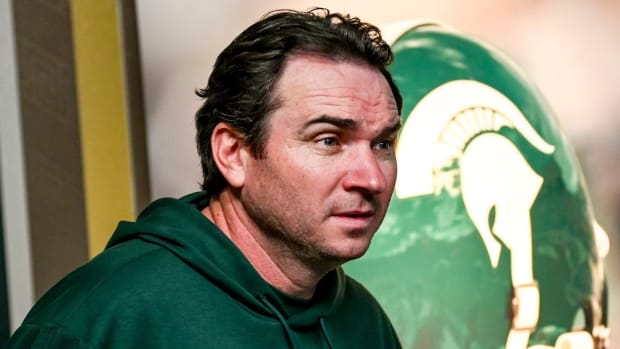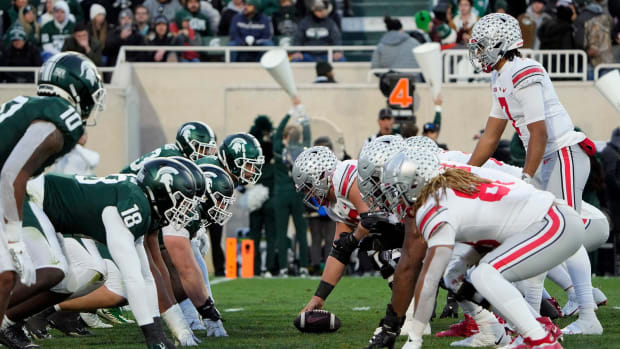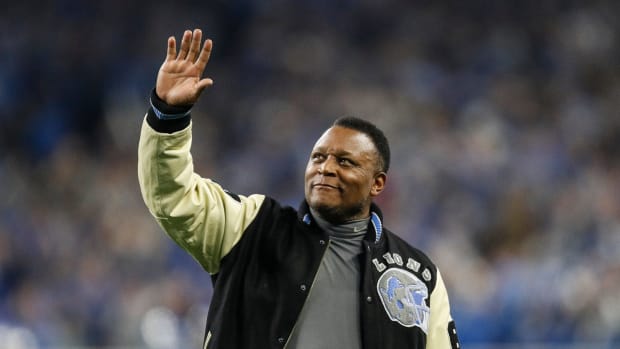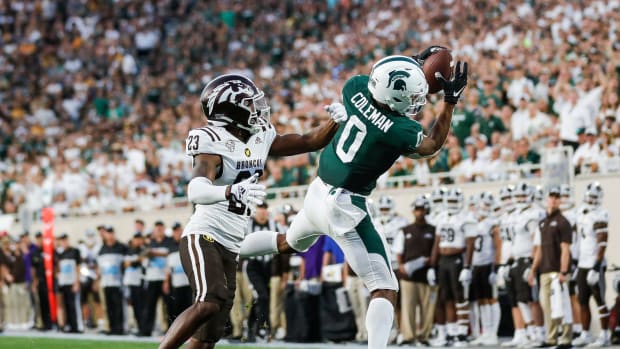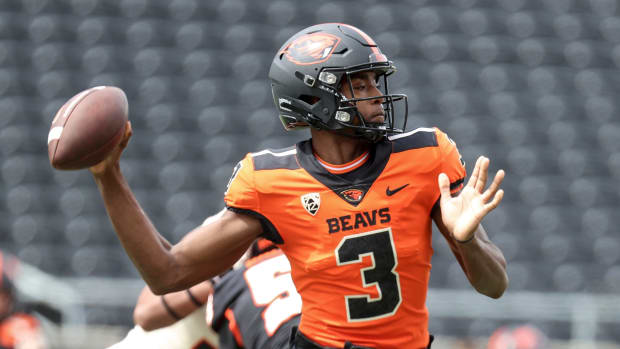College Football Notes & Quotes: Week 12
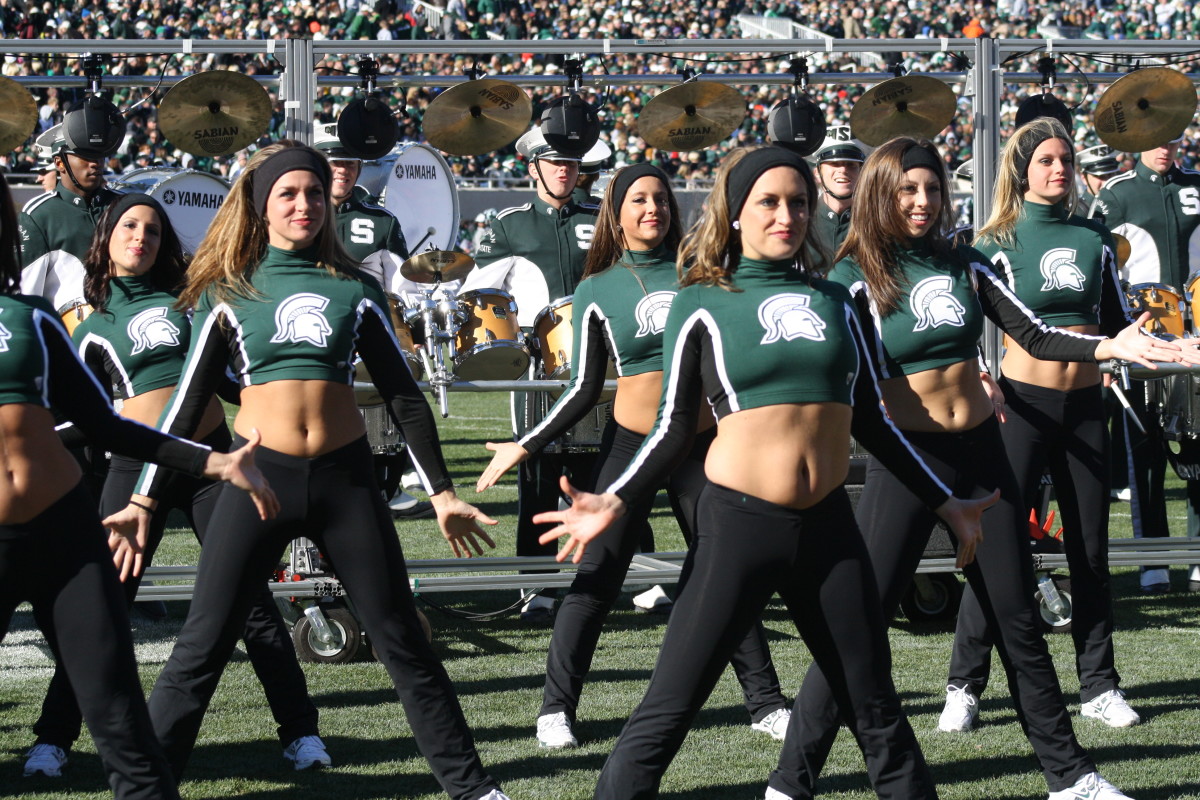
Spartan Nation again talked to Coaches around the Big Ten earlier this week to gather some thoughts to get you ready for the Conference’s penultimate weekend of play.
Mark Dantonio
On the foundation and focus of the Spartan Defense during his tenure:
“I would say our focus will always be to eliminate explosive gains (15 yards or more)…turnovers, which we’ve been outstanding this year, thus far, and then pressure the Quarterback, and be hard to run the ball against. If we can do those things, we’re going to be successful.
If we can win up front, pressure the Quarterback, things are going to start to happen. I would like to be defined by that…and tough to score on in the Red Zone…But it’s not necessarily how many yards you give up passing the football as long as the field shrinks and you play well in the Red Zone.
Big plays will kill you, turnovers will help you, pressuring the Quarterback, play well in the Red Zone.â€
On the importance of Strength and Conditioning Coordinator Ken Mannie to the 2010 Spartans’ success:
“A large amount of success in what we do is really evenly distributed around our coaching staff, and I feel Coach Mannie is a Coordinator. I feel he’s equal to a Defensive or Offensive Coordinator. He has day-to-day time with our players on a very much, a one-on-one basis. He has individual meetings…he holds them accountable, there’s “tough love†in existence there. There’s extremely difficult tasks he asks them to do.
All of those things are small steps towards winning a championship. And if you can’t win in the weight room, you can’t win on the field. Not just from a physical standpoint, strength and speed wise, but from an emotional standpoint in being able to push through the tough things. I think he does an outstanding job with that, and is one of our keys to victory.â€
Danny Hope
On what impresses him the most about the Spartan Offensive attack:
“The great balance that they have. Their potential from a passing standpoint is a great challenge. They have really good Wide Receivers, and an outstanding Quarterback. He doesn’t make very many mistakes, he has the threat of the deep ball, he’s accurate with his passes. They have an outstanding running attack, a good, tough Offensive Lineman. They have an Offense where they can do some things formation wise to get you lined up to their advantage…I think they’re a heck of a football team, and we’ve played some of the top teams in the country this year, and they are certainly one of top teams in the country.â€
On the Boilermakers’ tough times in 2010:
“We’ve got a heck of a football team, we just don’t have a very good record. We’ve had a lot of difficult injuries this year, but our team still takes the field on Saturdays believing that we can win.â€
Jim Tressel
On what makes a dominant Offensive Lineman at the College level, and if recruiting Offensive Lineman can be a bit tricky because of the relative competition level of High School opponents:
“Well, it really is. I think when you watch High School film of the guys at the size guys you’d like, they’re typically going against smaller people and in some ways, they’re at a disadvantage…Probably the biggest thing we look for is that athletic ability, that ability to bend their knees and their ankles, and play with their hips low.
You’d like to see if they can pass protect, but sometimes in the High School setting, they’re not challenged quite like they will be when they face the front fours of folks like we face every day in the Big Ten.
I just think, athleticism, intelligence…that toughness factor, those are all things that they have to have for you to gain great interest.â€
On the process they go through in evaluating the performance of Assistant Coaches:
“We do most of our evaluations on an ongoing basis from a standpoint of almost daily expectations. And then at the end of the year, after recruiting ends, and all those things, we take a lot more in depth evaluation system, starting with what that person felt as if they did well and what they feel as if they need to get much better at. Then you kind of find out if that’s in concert in what you were thinking, and what you observed on that ongoing basis. So we spend a lot of time in dialogue on evaluations (of Assistant Coaches).â€
Rich Rodriguez
On why the Wisconsin Offensive Line has traditionally become so dominant:
“Their program has been built on that for years. When Coach Alvarez was there, I think he started it. They’re very well coached. I think they do a great job of developing them in the weight room. They always talk about their size, but they’re very athletic as well. And they do a great job of buying into what they have in their system…They run a system, it’s not just big guys mauling people, they’re running plays…and if you take away one thing, they’re going to come with another thing. They system that Coach (Paul) Chryst (Badger Offensive Coordinator) has there fits those Offensive Lineman, and they’ve all bought into it for years.â€
On the unique challenges that the Badger Defensive Line presents to the “Spread-Run†attack of the Wolverines:
“They’re so big and strong up front, nobody really moves them off the line of scrimmage. And they work had too. We’ve really gotta work to match their work ethic, and we’ve really gotta strain to hold our blocks, and try to match their physicalness up front. They’re a little bit bigger than we are, but we’ve seen that all year...â€
Bill Lynch
On whether he felt Bret Bielema and the Badgers “ran it up†on Indiana last Saturday in their 83-20 romp:
“I didn’t have any problem. I said it after the game, and still feel the same way, it was our responsibility to stop them, and we didn’t do a very good job of that. And we didn’t take care of the ball…So I’ve gotta worry about our football team, and we’ve gotta correct the mistakes as we get ready for this one (Penn St.)â€
Joe Paterno
On how the Nittany Lions have improved over the course of this season:
“We’re just playing better, and we’re a little bit more alert. We’ve still got a young team. We’ve got 59 kids that are with us most of the time who are Freshman or Sophomores. We’ve got young Quarterbacks, none of whom have played (before 2010). Their experience has made them a little better, and the competition has…I’m sure we’re better right now than we were in the beginning of the season. How good we are, I don’t know…â€
On his relationship with the Washington, D.C. metro area (as the Lions prepare to play Indiana at Fed Ex Field in Landover, MD), and how important it’s been to his success at Penn St.:
“We’ve always been down there (recruiting)…we’re not as successful as we used to be because of the fact that Virginia Tech has become strong, Virginia is working at it…there are more people aware of the quality of the athletes in the whole metropolitan Washington area.
A lot of our graduates work down there…making a living in that particular geographical area, so I’m hoping we’ll have some fans there…Washington’s a good place to make an appearance, it’s a good sports town.â€
Bret Bielema
On whether the Badgers “ran it up†last Saturday, in an 83-20 win:
“Those were accusations that came from people that really, are outside influences, people probably that didn’t see the game. If you watched it, you’d see the way it unfolded…The part that surprises me is when other schools across the country put up big numbers, no one says anything, depending on the region…â€
P.A.T. (Perhaps Another Thought…)
Does the BCS really need the Big East and the ACC? Those two football conferences annually seem to come up short when compared with the other four “power†leagues. Is there reason to believe that for the long term, they will compete on a similar level with those other leagues? Recently, the disparity has only become more glaring. Maybe the BCS is simply too big at 6 conferences. Maybe it needs to shrink to four, and also lose the so-called “non qualifiers†until they join a “real†conference, and play a “real†schedule. Super Conferences?...anyone?
If Cam Newton is found to be ineligible, and Auburn knew or should have reasonably known that he would be found ineligible before deciding to play him in the 2010 regular season, they deserve the “SMU death penalty.â€Â After coming down hard on USC, the NCAA seemed to whiff on the Michigan decision, with relatively weak penalties for “major violations.â€Â But if the Newton saga continues on the track it appears to be headed, the NCAA enforcement arm should make powerful comeback. Why not penalize a school with a real deterrent for others to appreciate? The time to act with such a fury is before the sport loses itself any further into the shadows of dwindling integrity.
*Interact with Jonathan on Twitter @JPSpartan or inside the Phalanx Forum


